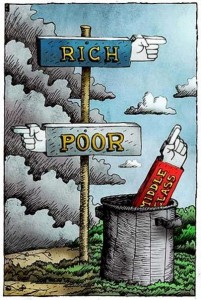‘When the rich get richer they get more powerful
and that puts them in the position to lobby for policies
that make them richer still’– former Clinton advisor Larry Summers.
I briefly read the French economist Thomas Piketty’s best seller CAPITALISM IN THE 21st CENTURY. The theme of Picketty’s work is on wealth concentration and distribution over the past 250 years taking a historical and statistical approach. The book substantiates that the rate of capital return in developed countries is persistently greater than the rate of economic growth (measured as GDP), and that this will cause wealth inequality to increase in the future. Picketty’s conclusion is no different than that of Graeber’s SAVAGE CAPITALISM IS BACK- AND IT WILL NOT TAME ITSELF. His argument is in line with David Graeber and where Graeber does not suggest a solution, Picketty proposes so by imposing a global tax on wealth with the objective of distribution. On the other hand Graeber has proposed that “if we want an alternative to stagnation, impoverishment and ecological devastation, we’re just going to have to figure out a way to unplug the machine and start again.” The question is how to combat the stagnation, impoverishment and ecological devastation being created by capitalism and cut off the ugly heads of this monster i.e unlug the capitalistic machine.
Within the past century, both communism and socialism were economic solutions for ensuring that wealth does not remain concentrated but is distributed in a fair and equitable manner. Neither were perfect and both had it’s weaknesses. However over the past century as the US grew in economic strength pursuing capitalistic policy, it has managed to enforce it globally and by empowering the select rich class by moving capital upwards through market forces (some of the tools being IMF, World Bank, US and European central banks, the stock markets and rampant consumerism leading to unchecked indebtness). The results have been impoverishment at the lower rungs of the economic ladder as well as social imbalances and ecological devastation not only in the west but also in poorer African and Asian countries where cheap labor is exploited to the benefit of wealthy class in the west as well as in their own countries where the corrupt politicians have amassed huge wealth in western banks. The final result of this exploitation has been addiction to consumerism, global indebtness and greed.
 James Myles, a senior research fellow at the University of Toronto’s school of public policy and governance, says there are economic costs to having people grow poorer, including a lack of spending power to fuel the economy. “One way of thinking about it is that in the ‘50s and ‘60s, we had huge economic growth but the benefits of growth were pretty evenly distributed among the population – you didn’t see rising income inequality,” he said. “Since 1980 or so, you also saw some economic growth – not as much as in the past – but most of those gains have been going to the top. Ever since the great recession of 2008, we see stagnation in economic growth and whatever little, it is benefitting the top 1%.”
James Myles, a senior research fellow at the University of Toronto’s school of public policy and governance, says there are economic costs to having people grow poorer, including a lack of spending power to fuel the economy. “One way of thinking about it is that in the ‘50s and ‘60s, we had huge economic growth but the benefits of growth were pretty evenly distributed among the population – you didn’t see rising income inequality,” he said. “Since 1980 or so, you also saw some economic growth – not as much as in the past – but most of those gains have been going to the top. Ever since the great recession of 2008, we see stagnation in economic growth and whatever little, it is benefitting the top 1%.”
In order to understand the implications of capitalism, CNN reported the statistical imbalance in an article titled AMERICA’s MIDDLE CLASS: POORER THAN YOU THINK. Jim Davies, an economic Professor at the Western Ontario University in Canada has reported that because it is so much easier for Americans to borrow money, the credit habit is eating away at their net worths. This is true not only in the US but globally so. Easy credit and consumerism among global middle class is another market force that has moved wealth concentration upwards creating social discontent and thus creating a growing lower middle class evolving from the middle class and a poor class evolving from the lower middle class. Much of the discrepancies have been created by concentrating wealth in the hands of those that control the media, technology, policies and social networking moguls who siphon wealth upwards (vacuuming) through brainwashing. Their easiest targets have been young college/ university graduates and children that are technology savvy as well as women in the consumer grouping. It is far more easier to control the mind of a one year child by exposing it to sublimal messages on the TV such that by the age of seven the child is fully attuned to those messages and believes it to be the eternal truth. In other words, that child is addicted to consumerism, wastage and indebtness. The messages are that of consumerism and subsequently wastage which are perceptibly not wrong thus benefitting the top 1%.
Graeber’s solution: figure out a way to unplug the machine (of capitalism) and start again (maybe from socialism). That is not going to be easy given the fact that the elite wealthy class controls the governments and bureaucracy reflective of Larry Summer’s words. There is only one solution – a social backlash and I do not mean from any one particular country but it is bound to be on a global wildfire scale. The countries that will suffer the most will be the western capitalists and then maybe the world may see the sense in the barter system where paper money will have no value or replaced by a metal system (gold and silver). More likely the former than the latter. Whatever, it seems that capitalism is doomed for failure.














In an interview with The Economist last week President Obama said when he brings up income inequality, he’s not trying to “stir class resentment” like his political opponents say.
“Feel free to keep your house in the Hamptons and your corporate jet … I’m not concerned about how you’re living,” he said.
However, he said he obsesses with the fact that under his watch those at the top are getting a larger and larger share of the economy, whereas middle-class and working-class families are stuck.
“Their wages and incomes are stagnant. They’ve been stagnant for almost two decades now,” he said.
CNN:4 August 2014